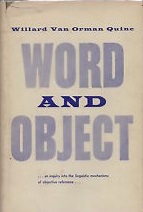Word and Object

Cover of the first edition
|
|
| Author | Willard Van Orman Quine |
|---|---|
| Country | United States |
| Language | English |
| Subject | Epistemology, language |
| Published | 1960 (MIT Press) |
| Media type | Print (Hardcover and Paperback) |
| Pages | 294 |
| ISBN | |
Word and Object is a 1960 work by philosopher Willard Van Orman Quine, in which Quine expands upon the line of thought of his earlier writings in From a Logical Point of View (1953), and reformulates some of his earlier arguments, such as his attack in "Two Dogmas of Empiricism" on the analytic-synthetic distinction. The thought experiment of radical translation and the accompanying notion of indeterminacy of translation are original to Word and Object, which is Quine's most famous book.
Quine emphasizes his naturalism, the doctrine that philosophy should be pursued as part of natural science. He argues in favor of naturalizing epistemology, supports physicalism over phenomenalism and mind-body dualism, and extensionality over intensionality, develops a behavioristic conception of sentence-meaning, theorizes about language learning, speculates on the ontogenesis of reference, explains various forms of ambiguity and vagueness, recommends measures for regimenting language to eliminate ambiguity and vagueness as well as to make perspicuous the logic and ontic commitments of theories, argues against quantified modal logic and the essentialism it presupposes, argues for Platonic realism in mathematics, rejects instrumentalism in favor of scientific realism, develops a view of philosophical analysis as explication, argues against analyticity and for holism, against countenancing propositions, and tries to show that the meanings of theoretical sentences are indeterminate and that the reference of terms is inscrutable.
Central to Quine’s philosophy is his linguistic behaviorism. Quine has remarked that one may or may not choose to be a behaviorist in psychology, but one has no choice but to be a behaviorist in linguistics.
...
Wikipedia
